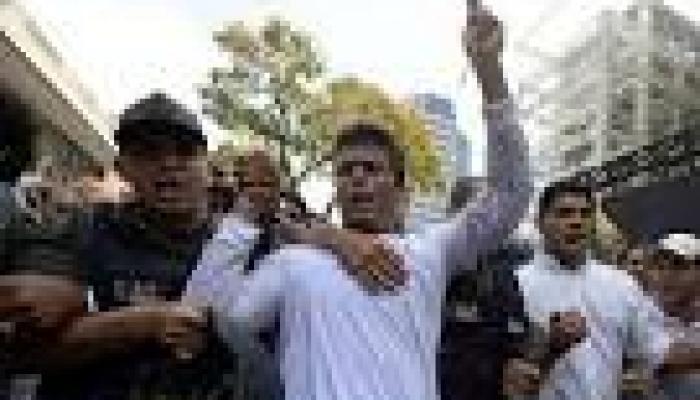Caracas, May 4 (RHC)-- Venezuelan opposition leader Leopoldo Lopez, who is seeking refuge in the Spanish embassy will have his political activities restricted, according to Spains's acting Foreign Minister.
“Spain will not permit its embassy to be converted in to a center of political activity by Mr (Leopold) Lopez, or anyone else,” acting Foreign Minister Josep Borrell said.
Spain's government acknowledged Thursday that the Venezuelan opposition figure, Leopoldo Lopez, who was illegally unlocked from house arrest to assist with an attempted coup d'état on the government under President Nicolas Maduro Tuesday, cannot request the status of political asylum from Venezuela because such a request must be made only within Spanish territory.
“Lopez has not asked for political asylum because, according to our legislation, for that you must request it while on Spanish territory,” Borrell said adding that while Lopez remains at the embassy, there would be a limit to his political activity.
According to the Venezuelan government, Lopez, who has sought refuge in the Spanish Embassy, cannot request political asylum as the European country was not a signatory of the Diplomatic Asylum Convention of Caracas of 1954.
Before escaping house arrest Tuesday, Lopez was already serving a 14-year sentence in prison for inciting violence during the 2014 protests that eventually lead to the deaths of dozens of people. He was released to house arrest in 2017.
After escaping domicile arrest, Lopez went to the Altimira highway meeting with the self-declared interim president Juan Guaido and about 30-40 defected soldiers all calling for a military uprising. He also gave interviews, which is prohibited with his sentence terms. That evening, Lopez entered the Chilean embassy in Caracas, but later moved to the Spanish embassy on April 30 where he remains.
On Thursday, May 2, the Fifth Court of the Criminal Judicial District of Caracas ordered his re-arrest and for the opposition figure to carry out the remainder of his sentence in the National Military Center at Ramo Verd. That night, Spain's acting Prime Minister Pedro Sanchez, whose Socialist Party (PSOE) won general elections last Sunday, announced his government has no plans at the moment to turn over the politician to Venezuelan authorities.
According to Spanish lawyer Sonarib Hernandez, the term 'guest' is being used while officials there search for a solution regarding Lopez that does not complicate diplomatic relations between the two countries.
Chilean Foreign Minister Roberto Ampuero suggested that Lopez's relocation from the Chilean to the Spanish embassy could be linked to the fact that his parents and sister have Spanish nationality, which could facilitate territorial asylum but not a transfer to Spain.
While the Spanish government has said it recognized Juan Guaido as president of Venezuela, centrist politician, Pablo Iglesias, told EFE this week that the nation's foreign ministry admitted to him doing so was a "mistake."
"It was indeed a mistake to recognize a president who does not want to call for free elections," Iglesias said the Spanish official told him.
The father of Leopoldo Lopez is a candidate of the conservative political group Popular Party (PP) for the European Parliament elections on May 26th. The leader of the PP, Pablo Casado has maintained a tough stance against the government of Nicolas Maduro, advocating for the overthrow of the Venezuelan leader.
Casado has said he is committed to cutting Venezuela's accounts in Europe, seizing the assets, as well as the financial assets of the South American country. Such types of sanctions are both illegal under international law and leading to the deaths of thousands of Venezuelans, a report co-authored by economist Jeffrey Sachs indicated last week.


